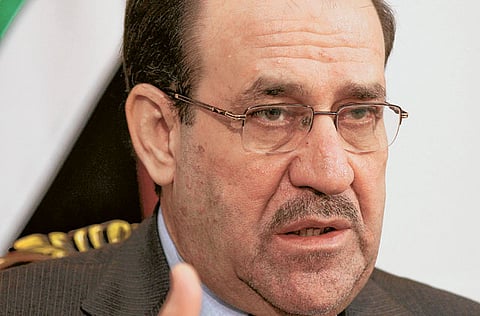Al Maliki calls Turkey a ‘hostile state'
Relations reach a new low as Iraqi pm says Erdogan has a sectarian agenda

Baghdad: Iraqi Prime Minister Nouri Al Maliki has branded Turkey a "hostile state" with a sectarian agenda, the latest in a series of bitter exchanges between the neighbours.
Al Maliki was responding to comments made by Turkish Prime Minister Recep Tayyip Erdogan on Thursday in which Erdogan accused the Iraqi leader of fanning tensions between the country's Shiites, Sunnis and Kurds with his "self-centred" ways.
"The recent announcements by Erdogan represent another return to flagrant interference in Iraqi internal affairs," Al Maliki said in a statement on his website.
"His announcements have a sectarian dimension. To insist on continuing these internal and regional policies will harm Turkish interests and make it a hostile state for all."
Al Maliki accused Turkey of trying to establish "hegemony" in the region.
Sectarian tensions flared in Iraq in December when the Shiite-led government tried to remove Sunni Deputy Prime Minister Saleh Al Mutlaq and sought an arrest warrant for Sunni Vice-President Tareq Al Hashemi on charges he ran death squads.
Dispute
Erdogan made his comments on Thursday after a meeting in Istanbul with Masoud Barzani, the president of the autonomous Kurdistan region in north Iraq, who has cultivated close relations with Ankara.
After closed-door talks with Barzani, Erdogan stoked further tensions with Iraq by accusing Al Maliki of taking an "egocentric approach" in politics.
"The current prime minister's treatment toward his coalition partners, his egocentric approach within Iraqi politics... seriously concern Shiite groups, Mr Barzani and the Iraqiya group," the main Sunni-backed political bloc, Erdogan was quoted by local media as saying.
Erdogan has warned before that Turkey, which is mainly Sunni but officially secular, would not remain silent if a sectarian conflict were to erupt in Iraq.
The city of Kirkuk is at the centre of a dispute between the central government and the Kurdish region, which claims the city and the region's rich oil reserves.
The rift between Baghdad and the Kurds recently worsened when the Kurdistan Regional Government said it was halting oil exports because the central government was not paying oil firms operating in the north. Turkey is worried that the violence in Syria and growing tensions in Iraq could lead to a wider conflict between Shiite and Sunnis in the region.
Tense
It is a new low for Iraq-Turkey ties, although relations have been tense for some time.
Earlier this year, Erdogan warned Al Maliki against fomenting sectarian tensions, which Al Maliki said "provoked all Iraqis," and the two countries called in each other's respective ambassadors to express their anger.
Sunni-majority Turkey and Shiite-majority Iraq have taken sharply different tacks on violence in Syria, an issue that has furthered sectarian tension and division between Sunni and Shiite states in the region.
In Syria, the regime of President Bashar Al Assad, a member of the minority Alawite sect which is an offshoot of Shiite Islam, is carrying out a bloody crackdown on a Sunni-led uprising against his rule in which thousands of people have been killed.
Erdogan has called for Al Assad to step down, while Al Maliki has said non-interference in Syria and opposition to arming either side in the conflict is in Iraq's best interest.
Iraq is Turkey's second largest trading partner after Germany, with trade reaching $12 billion (Dh44 billion) last year, more than half of which was with the Kurdistan region.



